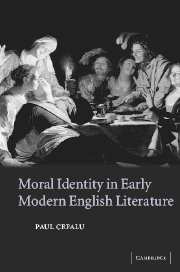Book contents
- Frontmatter
- Contents
- Acknowledgments
- Introduction: English Protestant moral theory and regeneration
- Chapter 1 Shame, guilt, and moral character in early modern English Protestant theology and Sir Philip Sidney's Countess of Pembroke's Arcadia
- Chapter 2 The three orders of nature, grace, and law in Edmund Spenser's The Faerie Queene, Book II
- Chapter 3 Conformist and puritan moral theory: from Richard Hooker's natural law theory to Richard Sibbes's ethical occasionalism
- Chapter 4 The elect body in pain: Godly fear and sanctification in John Donne's poetry and prose
- Chapter 5 Absent neighbors in George Herbert's “The Church,” or Why Agape becomes Caritas in English Protestant devotional poetry
- Chapter 6 Moral pragmatism in the theology of John Milton and his contemporaries
- Epilogue: theorizing early modern moral selfhood
- Notes
- Index
Chapter 5 - Absent neighbors in George Herbert's “The Church,” or Why Agape becomes Caritas in English Protestant devotional poetry
Published online by Cambridge University Press: 22 September 2009
- Frontmatter
- Contents
- Acknowledgments
- Introduction: English Protestant moral theory and regeneration
- Chapter 1 Shame, guilt, and moral character in early modern English Protestant theology and Sir Philip Sidney's Countess of Pembroke's Arcadia
- Chapter 2 The three orders of nature, grace, and law in Edmund Spenser's The Faerie Queene, Book II
- Chapter 3 Conformist and puritan moral theory: from Richard Hooker's natural law theory to Richard Sibbes's ethical occasionalism
- Chapter 4 The elect body in pain: Godly fear and sanctification in John Donne's poetry and prose
- Chapter 5 Absent neighbors in George Herbert's “The Church,” or Why Agape becomes Caritas in English Protestant devotional poetry
- Chapter 6 Moral pragmatism in the theology of John Milton and his contemporaries
- Epilogue: theorizing early modern moral selfhood
- Notes
- Index
Summary
Ever since Herbert's poetry was reclaimed for the Protestant tradition some decades ago, Herbert's critics have tended to emphasize Herbert's belief that agape, rather than caritas, describes the proper affective bond that should inhere between God and the disciple. For the Lutheran tradition, agape signifies spontaneous, descending love from God to man, without assuming a reciprocal upward movement by the justified sinner. Caritas, on the other hand, as described principally by Augustine, signifies an affective bond between man and God that is initiated by the communicant's acquisitive love and desire for self-fulfillment. For Augustine, acquisitive love directs its path away from material goods and upwards to God, its summum bonum.
Rosemond Tuve offered the foundational discussion of the agape-caritas relationship in Herbert's poetry, pointing out that “The Church” depicts sacred love as principally a one-way path from God to the individual: “Herbert seems to write much more of God's love for man than of what man's love to God should be …” For Tuve, Herbert's views on agapic love presuppose his Christology: “Herbert celebrates in poem after poem God's love for man, Agape, and the single complete revelation of it in Christ's Incarnation and Passion.” In spite of some quibbling, Arnold Stein and Richard Strier tend to agree with Tuve that the agape rather than caritas motif prevails in the devotional lyrics of “The Church.”
- Type
- Chapter
- Information
- Moral Identity in Early Modern English Literature , pp. 134 - 156Publisher: Cambridge University PressPrint publication year: 2004



